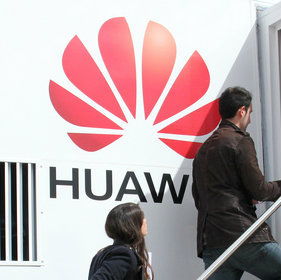The Chinese equipment vendor is redesigning optical systems to use 'second-best' components, says analyst at MKM Partners.

Huawei is redesigning products to make use of "second-best" components it can legally acquire after its name was recently added to a US trade blacklist, according to an analyst who tracks some of the Chinese vendor's US suppliers.
Michael Genovese, an equity analyst with MKM Partners, issued a research note saying his checks had revealed Huawei is redesigning its optical systems and other products in response to the US moves, which prevent US companies from engaging in commercial transactions with the controversial Chinese vendor.
Huawei appears to be exploiting a loophole in the Export Administration Regulations (EAR) that allows US companies to serve it if the intellectual property (IP) is not based in the US. II-VI, one of Huawei's optical component suppliers, has seen little disruption to its business because most of its photonics IP is based in Japan, according to Genovese.
This loophole could prove critical for NeoPhotonics, another supplier whose very survival has seemed at stake because so much of its business is with Huawei, which accounted for nearly half of its revenues for the first three months of the year.
Huawei has drawn up contingency plans, says Genovese, to switch from the "highest-quality" lasers and receivers that NeoPhotonics develops in the US to its Japan-based products instead. The solution is not ideal, according to the analyst, because the US equipment is superior. But it would allow Huawei to continue operating in the absence of alternatives.
Lumentum, another optical components specialist, could also take advantage of the EAR rules. Its takeover of rival Oclaro has given it "UK- and Japan-based products it can potentially still ship to Huawei," says Genovese.
"We do not think NeoPhotonics or Lumentum have seen new orders for products with overseas IP from Huawei yet, but we think they likely will soon," he said in his note issued today. "Once these orders begin, it will likely put the companies' results above the last guidance updates they each gave that completely removed Huawei from future revenue shipments."
The update comes after NeoPhotonics issued a profit warning for the second quarter, predicting that sales would come in at $75 to $80 million, down from an original forecast of $88 to $93 million. NeoPhotonics' share price has fallen 38% since the start of the year but is up from a low point of $3.56 on May 28 and trading at about $4.09 at the time of publication.
Zero in on how network technology investment drives 5G services strategies. Join us for the free 5G Network & Service Strategies breakfast workshop in LA at MWCA on October 22. Register now to learn from and network with industry experts; communications service providers get in free!
US authorities have waged a long-running campaign against Huawei, arguing its products may include "backdoors" for Chinese government spies. The charge that Huawei has close ties to the Chinese government and could threaten security has been repeatedly denied by the Chinese firm.
Senior US politicians have been urging governments in other countries, including the UK, to ban Huawei from their 5G markets. Australia, Japan and New Zealand have imposed restrictions on Chinese vendors in recent months, but other countries have been resisting the US pressure.
In the UK, Jeremy Wright, the government secretary for the department of culture, media and sport (DCMS), this week said US moves have made a government decision about the Chinese vendor's role in 5G networks "a more difficult judgment than it was before."
The country's mobile operators, most of which have relied heavily on Huawei as a 4G supplier, are awaiting the outcome of a DCMS supply chain review that was previously expected to restrict Huawei's role in the "core" of their 5G networks but allow it to continue selling 5G radio equipment. BT and Vodafone, two of those operators, have complained about the current uncertainty.
The US decision to add Huawei's name to the so-called "Entity List" marked a huge escalation of the campaign against it and has ramifications for the entire industry. Experts have warned it could ultimately lead to the fragmentation of global standards and supply chains.
Huawei was asked about reports it is redesigning products to use "second-best" components but had yet to provide a comment at the time of publication.
Related posts:
— Iain Morris, International Editor, Light Reading
About the Author(s)
You May Also Like











